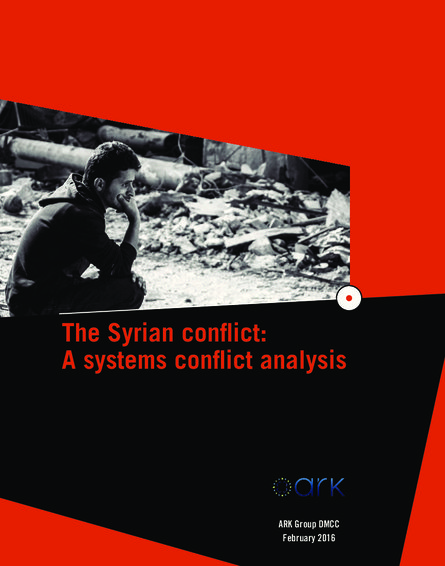
Over the last eight months, ARK has been engaged in a systems conflict analysis exercise that aims to identify the key drivers of conflict in Syria, the inter-dependencies between those factors, and possible intervention points to break certain causal loops of the conflict. The process began with a workshop in June 2015 led by CDA Collaborative Learning Projects involving all ARK programme staff and has continued through structured discussions and complementary research led by ARK’s Research and Analysis team. The resulting product is a conflict mapping consisting of not only this report but also a commitment to curate this analysis in the public discussion space as a living document that can evolve with the conflict and, we trust, maintain its relevance. ARK has led this exercise not as a contracted research product but rather as a self-funded corporate initiative to inform the scholarship about the Syrian conflict and support the work of governments and stabilisation practitioners by providing them with research-informed, evidence-based insights. Unlike other reports targeting specific themes or geographies of the Syrian conflict, this report is meant as a tool rather than as a definitive history or a snapshot in time. It is therefore of limited value to attempt to summarise its content, as even the main Systems View of National Conflict map and the related sub-systems maps, which offer a schematic representation of our understanding of the conflict, require considerable narrative elaboration to achieve the desired effect. The section ‘How to Read this Report’ outlines the principal substantive sections of our analysis and will allow the reader to move to the chapter of greatest interest. Nevertheless, we urge readers to treat their interaction with this analysis as a process, and to invest the time not only to read the report in its entirety but also to return to the analysis periodically through ARK’s virtual space, as the conflict evolves, to contribute their insights to this living document.
Resource collections
- Topics
- UN Habitat - Urban Response Collection
- Urban Response - Urban Crisis Preparedness and Risk Reduction
- Urban Response Collection - Community Engagement and Social Cohesion
- Urban Response Collection - Economic Recovery
- Urban Response Collection - Environment and Climate Change
- Urban Response Collection - Housing, Land and Property
- Urban Response Collection - Urban Crisis Response, Recovery and Reconstruction
- Urban Response Collection - Urban Resilience